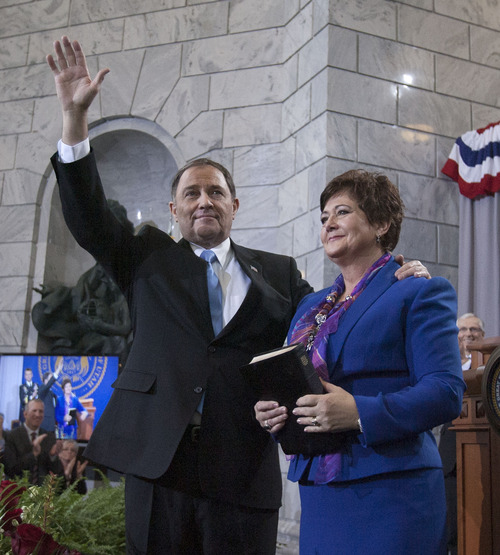This is an archived article that was published on sltrib.com in 2013, and information in the article may be outdated. It is provided only for personal research purposes and may not be reprinted.
Gov. Gary Herbert is endorsing significant ethics changes for executive branch officials — including the Attorney General's Office — in the aftermath of a scandal that is dogging Attorney General John Swallow.
Herbert urged Utahns to reserve judgment on Swallow until the facts come out through an ongoing federal investigation into Swallow's conduct.
"I'm a little concerned about the rush to judgment that some have exhibited on this issue," Herbert said Thursday during his monthly KUED news conference. "That being said, I do believe there is some need for reform."
But the governor said he would support the creation of an ethics commission, like the one that hears ethics complaints against legislators, to investigate complaints against his own office, as well as the attorney general, treasurer and auditor offices.
He said he also supports a proposal from Sen. Todd Weiler, R-Woods Cross, that would significantly restrict the work state officials can do outside of the office.
"I think that's some legislation that ought to be introduced and passed in the upcoming Legislature," Herbert said.
Sen. John Valentine, R-Orem, and Sen.-elect Jim Dabakis, who is also the chairman of the Utah Democratic Party, are working on legislation that would create an ethics commission to investigate complaints, similar to the one the Legislature has created for itself.
Utah Republican Party Chairman Thomas Wright has also called for the creation of an ethics commission and said on Wednesday that Swallow had made "mistakes" in his dealings with St. George businessman Jeremy Johnson, who approached Swallow in 2010 seeking help with a Federal Trade Commission investigation into his businesses.
Johnson says Swallow put him in touch with Check City owner Richard Rawle and helped broker a $600,000 bribe of Senate Majority Leader Harry Reid. Swallow denies that and says he connected Johnson with Rawle so Rawle could hire a lobbyist to work on Johnson's case. Reid has denied any knowledge of Johnson's case as well.
Herbert said he is not pre-judging Swallow and said calling Swallow's action a mistake is easy.
"It's kind of easy for anybody to sit on the sidelines and say, 'Well, gee, I wouldn't have done that,' not having been in that situation. That's potentially disingenuous," Herbert said. However, he said he had never met with Johnson and, if he would have been approached by him, would have declined a meeting.
Herbert said if federal prosecutors issue indictments against Swallow, it creates problems for him but doesn't mean he is guilty. If he is convicted, Swallow would have to resign, Herbert said.
At the time Swallow was arranging meetings for Johnson, he was also doing consulting work for Rawle on a Nevada cement project, which was not disclosed in his campaign filings.
"I know we have a lot of rumor, innuendo. We have people who have been accused of being kind of con men speaking as if they have credibility so we will wait and see what the facts are," Herbert said. "Let's wait and see what happens with the federal investigation."
Weiler said that kind of arrangement — where Swallow received $23,500 for his cement project consulting, on top of the $210,000 he received from the state in salary and benefits — is exactly what his bill would target. Swallow has argued that because he was a political appointee he was exempt from restrictions on outside employment that apply to career attorneys in the office.
"Most of the feedback I've gotten on Capitol Hill is we don't want that kind of work being done," Weiler said Thursday.
Weiler said he is trying to leave room so state employees could teach classes or do other work, as long as it doesn't conflict with their official duties.
"I think the public has weighed in, saying, 'We've got a full-time attorney general and he's paid what? And he's doing what?' " Weiler said.
Twitter: @RobertGehrke —
Guv: Utah will follow federal gun law
Herbert urged both sides in Utah's gun debate to approach the issue in a reasonable, rational way. "I think we need to adhere to the law," he said. > B4



